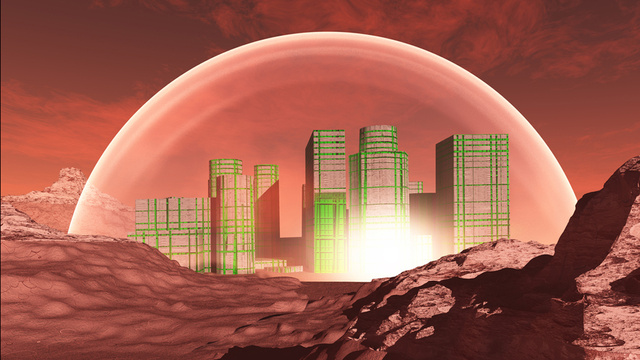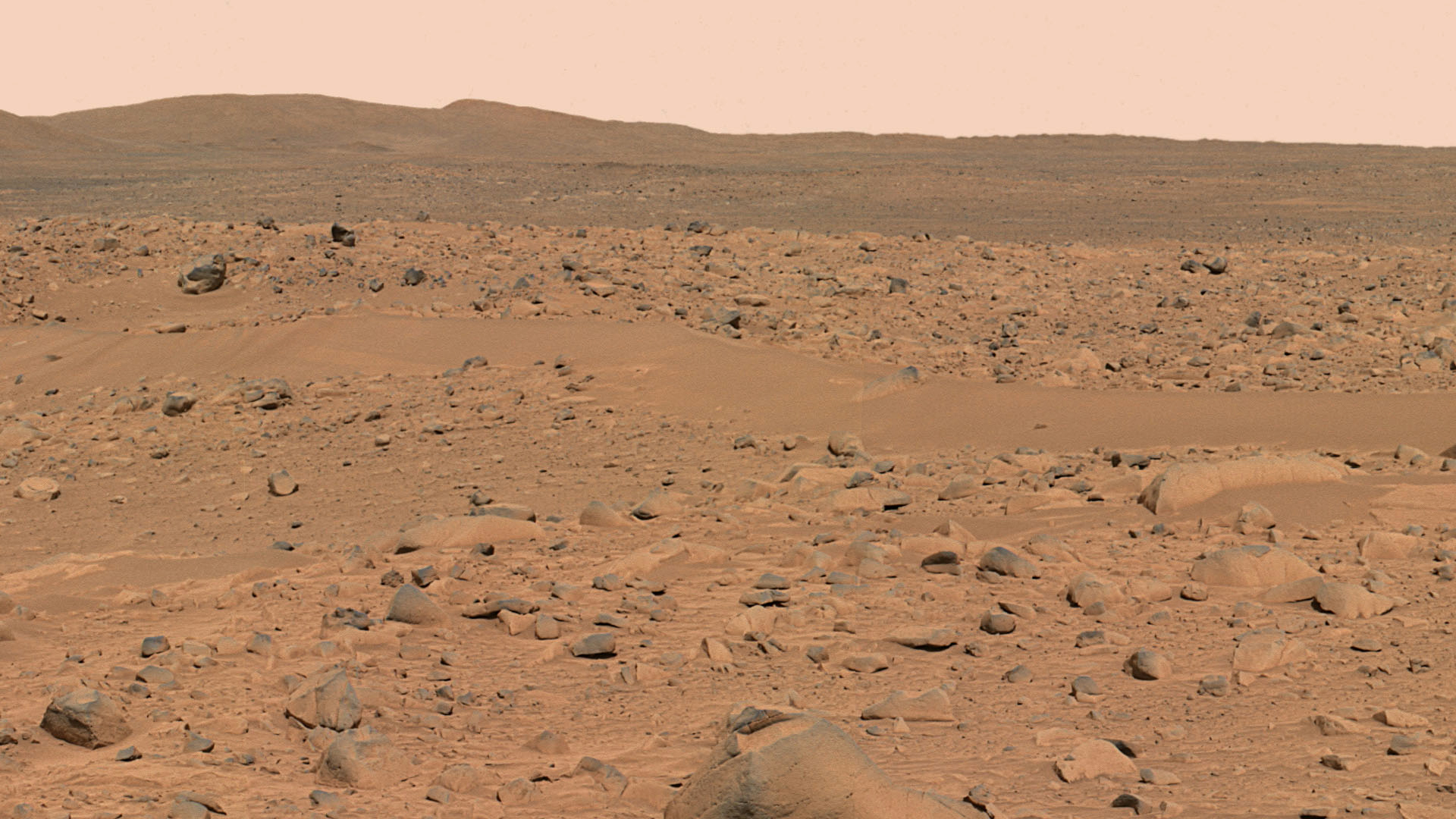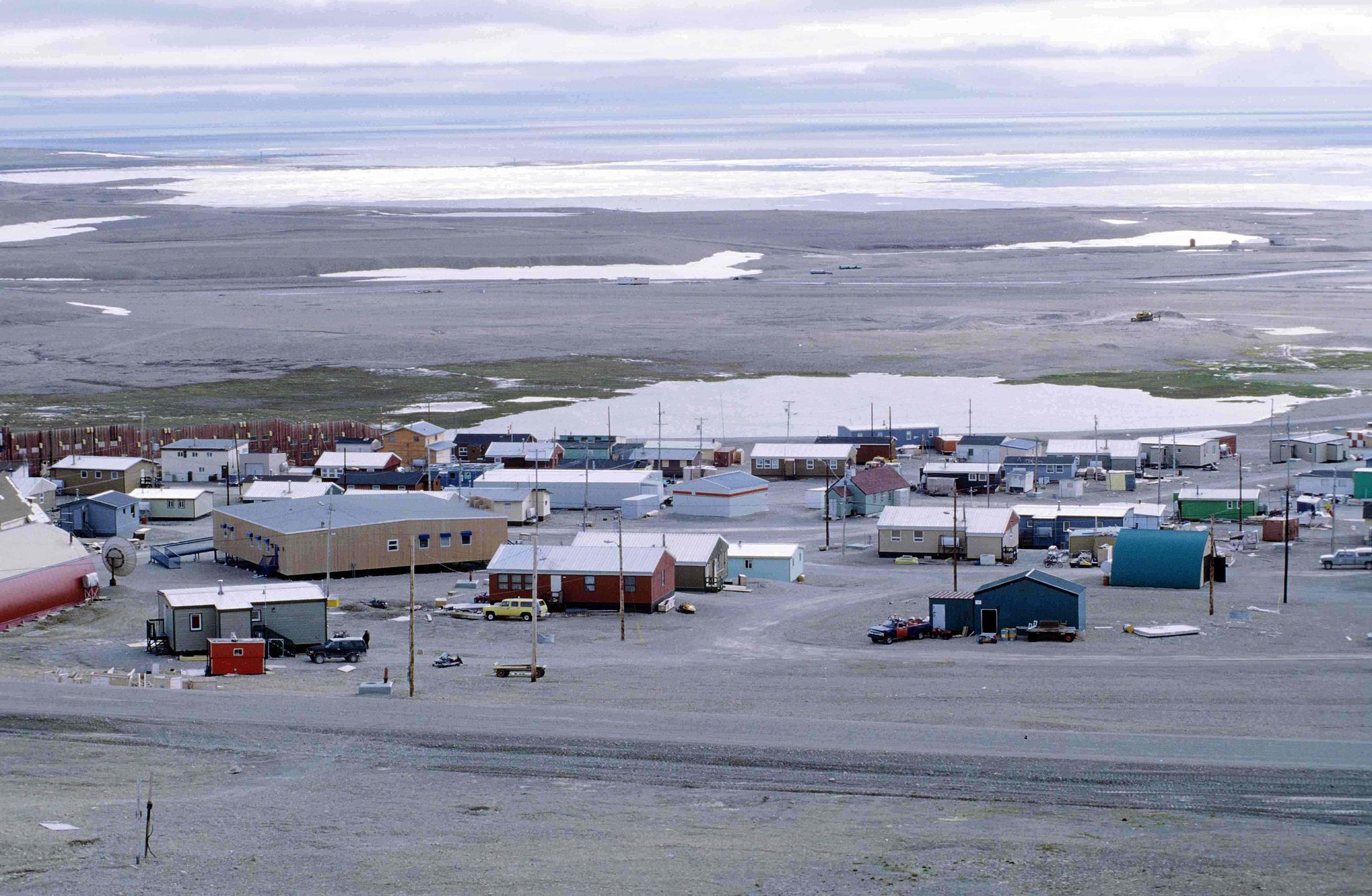= ASTRONAUTICAL EVOLUTION =
Issue 112, 1 April 2015 – 46th Apollo Anniversary Year
26th Mariner Anniversary Annum
| Site home | Chronological index | About AE |
Mars: An Awful – or an Awesome – Place to Live?
“Great God, this is an awful place!”
A few years ago, enthusiasts for colonising Mars were dealt a rude wake-up call. It was delivered by Charles Cockell (now Professor of Astrobiology at the University of Edinburgh; surname stressed on the second syllable), in the form of an article with the challenging title “Mars is an awful place to live”.
Cockell – an experienced polar explorer – pointed out a few well known facts about the environment at the surface of Mars. The mean annual air temperature is minus 60°C, and the local temperature barely gets up to zero of a torrid equatorial summer afternoon. On the other hand, the intensity of biologically damaging solar ultraviolet light that reaches the surface is between 100 and 1000 times greater than on Earth, despite Mars’s greater distance from the Sun. Galactic cosmic rays also penetrate the thin atmosphere and create a dangerous radiation environment (though Robert Zubrin has argued that there is sufficient atmospheric mass to protect against solar storm particles). The air is of course totally unbreathable, and pressurised suits or vehicles are required for surface mobility. The landscape and sky are monotonously coloured in shades of orange, reddish brown and salmon pink, and the land is entirely bare rock and dust, with no water and no vegetation to provide variety.
In comparison, a settlement in Earth’s Arctic or Antarctic regions must seem a paradise. Cockell gives as an example the town of Resolute, located at 67°N on Cornwallis Island in Canada. Yet nobody is flocking to settle there. Apart from the small resident Inuit population, who have lived in the Arctic for generations, it only houses visitors on their way north for scientific research or to work at a nearby lead and zinc mine, or on their way back south again – homewards.
Immigrants into Resolute – visionary pioneers fleeing the warmth and comfort of the crowded south in order to enjoy the isolation, deprivation and hardships of the land of opportunity in the frozen north – are conspicuous by their absence.
But if there is no movement of population towards colonising the wide open spaces of Earth’s polar regions, why should we expect people to want to settle and live permanently on Mars, where conditions are considerably more extreme? (And the cost of access to Mars, one might add, is vastly greater.)
Cockell criticises the popular analogy of expansion into the American West, which, he points out, bears no resemblance to Mars. In addition to the purely physical stresses of life on Mars, he raises the issue of political freedom. Almost anywhere on Earth people have enough freedom of movement to organise resistance against political tyranny. On Mars, by contrast, one would be restricted to a very limited space within pressurised structures, dependent upon the authorities even for the air one breathed. With no means of escape, the restrictions on freedom could be worse than those imposed by a totalitarian regime on Earth. This argument is a direct attack on the core of Zubrin’s rationale for settling Mars.
The only hope for Mars as a second home for humanity, as an attractive new world of opportunity, Cockell believes in this article, is if it could be terraformed. Without a sufficiently Earthlike surface environment for people to be able to move around freely, Mars in his view offers only the prospect of isolated scientific outposts, human-tended mining operations and centres for extreme adventure tourism.
Meanwhile, any visitor to Mars will surely echo the words of Robert Falcon Scott, on his arrival at the South Pole in 1912, quoted at the top of this section. And turn around and go quickly home to Earth.
“Mars can be settled. For our generation and many that will follow, Mars is the New World.”
Is Cockell’s comparison a fair one?
Firstly, nobody on Mars will be expected to directly expose their soft pink bodies to sub-zero temperatures, unfiltered sunlight, lethal prompt radiation doses, or the suffocating near-vacuum. The harsh environment is therefore not a measure of physical hardship, but rather of the technological support required by immigrants from Earth, and therefore the costs of their upkeep on Mars.
Notably, these same environmental hazards are present to a lesser extent on regular commercial passenger aircraft flights at 11 km altitude, but this doesn’t stop people taking those flights in their millions. The hazards are therefore perfectly familiar from our terrestrial experience, and the technologies to protect against them well developed.
Secondly, if one takes the longer view, then a process of colonisation of the Earth’s more inhospitable regions is in fact in progress. As Cockell says, humans were originally a tropical species. Here are some of the places (including Resolute) where that tropical species now lives (from north to south):
- Longyearbyen, Spitsbergen Island, Svalbard archipelago, 78°13′ N, pop. 2,000, founded 1906 – the world’s northermost town.
- Grise Fiord, Ellesmere Island, Nunavut, Canada, 76°25′ N, pop. 130, founded 1953 by the Canadian government – Canada’s northernmost settlement.
- Resolute, Cornwallis Island, Nunavut, Canada, 74°42′ N, pop. 229, founded 1953 by the Canadian government.
- Barrow, Alaska, 71°18′ N, pop. 4,400, founded ca. 500.
- Hammerfest, Norway, 70°40′ N, pop. 10,000, founded ca. 17th century, but the region inhabited back to the Stone Age.
- Kirkenes, Norway, 69°44′ N, pop. 3,500, founded ?
- Tromsø, Norway, 69°41′ N, pop. 72,000, founded 1794, but the region inhabited since the end of the ice age.
- Norilsk, Krasnoyarsk krai, Russia, 69°20′ N, pop. 175,000, founded ca.1930 (as a forced labour camp, part of the notorious Soviet GULAG system) – the northernmost city with over 100,000 inhabitants.
- Murmansk, Murmansk oblast, Russia, 68°58′ N, pop. 300,000, founded 1916 – the largest city north of the Arctic Circle.
- Narvik, Norway, 68°25′ N, pop. 18,500, founded 1870s, but the region inhabited since the Stone Age.
- Vorkuta, Komi republic, Russia, 67°30′ N, pop. 70,000, founded 1931 (as a forced labour camp, part of the notorious Soviet GULAG system).
- Bodø, Norway, 67°18′ N, pop. 50,000, founded 1816 from a pre-existing village.
- Sisimiut, Greenland, 66°56′ N, pop. 5,600, founded 1764, but the region inhabited intermittently for the past 4500 years.
- * * * Arctic circle at 66°34′ N * * *
- Rovaniemi, Lapland, Finland, 66°30′ N, pop. 62,000, founded ca. 15th century, but the region inhabited since the Stone Age.
- Arkhangelsk, Arkhangelsk oblast, Russia, 64°32′ N, pop. 349,000, founded ca. 9th century.
- Nuuk, Greenland, 64°11′ N, pop. 16,500, founded 1728, but the region inhabited as far back as 2200 BCE.
- Reykjavik, Iceland, 64°08′ N, pop. 120,000, founded ca. 870.
- Iqaluit, Nunavut, Canada, 63°45′ N, pop. 6,700, founded 1942 as a U.S. air base.
- Yellowknife, Northwest Territories, Canada, 62°27′ N, pop. 19,000, founded 1936.
- Tórshavn, Faroe Islands, 62°01′ N, pop. 19,000, founded 850.
- Anchorage, Alaska, 61°13′ N, pop. 301,000, founded 1914.
- Whitehorse, Yukon, Canada, 60°43′ N, pop. 28,000, founded at the end of the 19th century.
Thus I’ve counted two cities with more than 100,000 inhabitants north of the Arctic circle, and three more within 600 km south of the circle. Over 700,000 city dwellers are permanent Arctic residents.
And yet Cockell’s main point stands: these settlements are not exactly the new world, enticing immigrants to a land of opportunity and freedom. Partly, of course, because they have all been incorporated politically into existing countries. And partly because their inhabitants are still subject to cold, winter darkness and vile Arctic weather. They are not insulated from their external environment as one would be in any kind of space or planetary colony.
What is to be done? Must Cockell’s entire argument be conceded, that Mars will never play host to more than the occasional rugged outpost of civilisation? What then of the concept of general Solar System colonisation?
Without Mars as a first step towards self-sufficiency beyond Earth, the entire project could fail. Given the immense distances between neighbouring stars, and the even greater distances separating us from the nearest exoplanets more hospitable than our own Arctic and Antarctic, humanity would never grow into a galactic species, but remain confined to Earth for the remainder of its cosmically fleeting existence.
I believe an answer can be found, that Robert Zubrin’s quote at the head of this section can be realised (The Case for Mars, p.xvi). The key, I think, is to accept what is valid in Cockell’s argument, but then to invert it.
A topic to which I return next month…

Reference
Charles S. Cockell, “Mars is an awful place to live”, Interdisciplinary Science Reviews, vol.27, no.1 (2002), p.32-38.
Please send in comments by e-mail.
Interesting and relevant comments will be added to this page.
| Site home | Chronological index | About AE |

